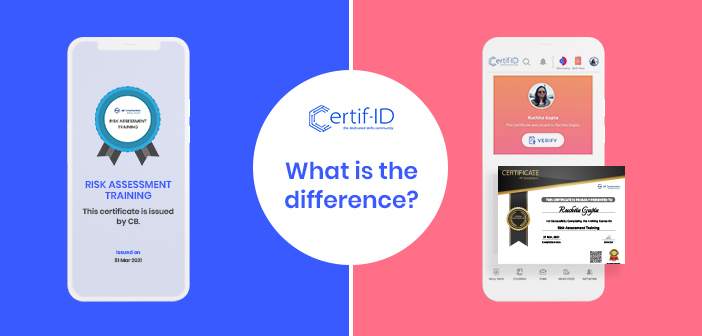Today, the way credentials are being awarded is changing. More and more people are opting for blockchain digital credentials because it is secure, cost-effective, and comes with a guarantee of easy verification.
If you are interested in going digital with your certification process, this blog will help you make the right choice about the way forward.
Digital credentials are of two types: digital badges and digital certificates. Having a better understanding of them can help you select wisely. So, without further ado, let us take a look at them.
Digital Badges
Digital badges are a segment of the larger digital credentialing ecosystem. It is safe to say that they haven’t been used to their full potential and are still evolving. Often, they are awarded to recognise an individual’s accomplishment, interests or even for simple tasks such as watching a video online.
Earning digital badges are great to recognise peoples’ efforts and support them.
Up until 2011, digital badges were not famous. The paper “An Open Badge System Framework,” which was co-authored by Peer 2 Peer University and The Mozilla Foundation increased its popularity. The paper talks about the significant impact digital badges can have and how they can motivate learning and aid achievement.
The advantages of DIGITAL BADGES include;
- Motivation: digital badges differ from traditional certificates. They are used to provide quick feedback and recognition for various reasons including, attendance, participation, or achievement.
For example,
- In 2016, IBM used open badges for their worldwide training program and saw drastic participation because of the same.
- TripAdvisor, a travel website, began issuing digital badges to users who submit reviews on their website. This led many people to share their travel experience just so they could earn more badges.
Digital badges act as small rewards that one can accumulate before earning substantial rewards, recognition and other incentives.
- Recognition: digital badges are generally useful in providing a foundational assessment that offers direction or feedback to individuals.
For instance, if an institute awards students who have mastered a skill with digital badges, then those who do not earn a badge can be counseled and helped to improve their skills.
 Digital Certificates
Digital Certificates
Digital certificates are digital alternatives to traditional certificates. They can be as simple as PDFs or encrypted certificates issued on blockchain. A scanned PDF certificate can be secured with a password. However, they can be modified using any PDF reader.
So, in this blog, let us focus on digital certificates issued on blockchain. They are secure and traceable. Unlike traditional certificates, they can contain additional information, such as skill level achieved, projects completed, QR code and more.
Digital certificates issued on blockchain are gaining popularity amongst educational institutions including corporate training institutes. Why? They are easy to access, and can be shared, viewed and verified through a web link.
The advantages of BlOCKCHAIN-BASED DIGITAL CERTIFICATES include;
- Easy verifiability: when an individual receives a digital certificate on blockchain, an unalterable link is created between the individual’s certificate and the issuing body. So, everytime someone verifies the certificate, it will direct them to the issuing body. And, if the certificate is altered, it will fail verification. This ensures that the individual’s records are secure and impossible to counterfeit.
- Data security: unlike traditional certificates, digital certificates are delivered instantly and are secure. So, even if the certificates are shared multiple times on multiple platforms, it remains safe – removing the worry of it being used by someone else.
- Easily shareable: Anyone who has earned a digital certificate can easily share it with recruiters and on social media. As the certificates are verifiable, it will help them flaunt and prove their achievement.
- More control: only the issuing authority has full control over digital certificates issued on blockchain. Neither any third party agency curating the certificates nor the receiver can make changes to it. The issuing authority is the only body who can re-issue, revoke, extend the validity, and/or terminate the certificate.
Considering the fact that the pandemic is accelerating digitalisation, from contactless payments to buying virtual real estate. Now is the time to digitise your traditional certification process.
Both digital certificates and digital badges are validated indicators of achievements, learning outcomes. It is for you to decide what suits your needs best.
Also read: Universities can play a key role in overcoming skill shortages https://nationalskillsnetwork.in/universities-can-play-a-key-role-in-overcoming-skill-shortages/
If you’ve any questions, please feel free to write to us, we will get back to you.
We at Certif-ID offer a platform for education and training institutions to issue blockchain-based digital certificates. Our aim is to harmonise educational standards and provide equal opportunities for all.
Join us in changing the certification landscape one digital certificate at a time.
If you’re interested in knowing more about Certif-ID, please book a one-on-one meeting here.














Comments 1